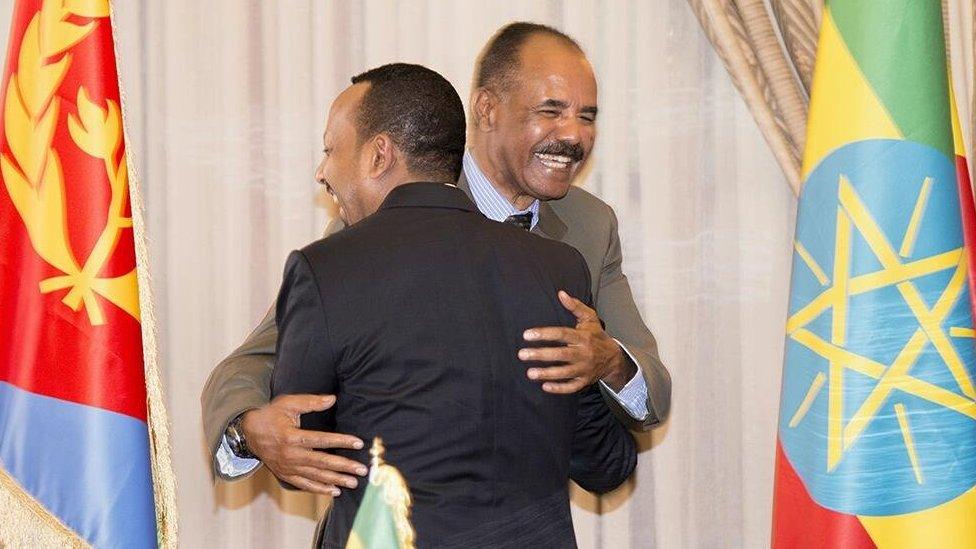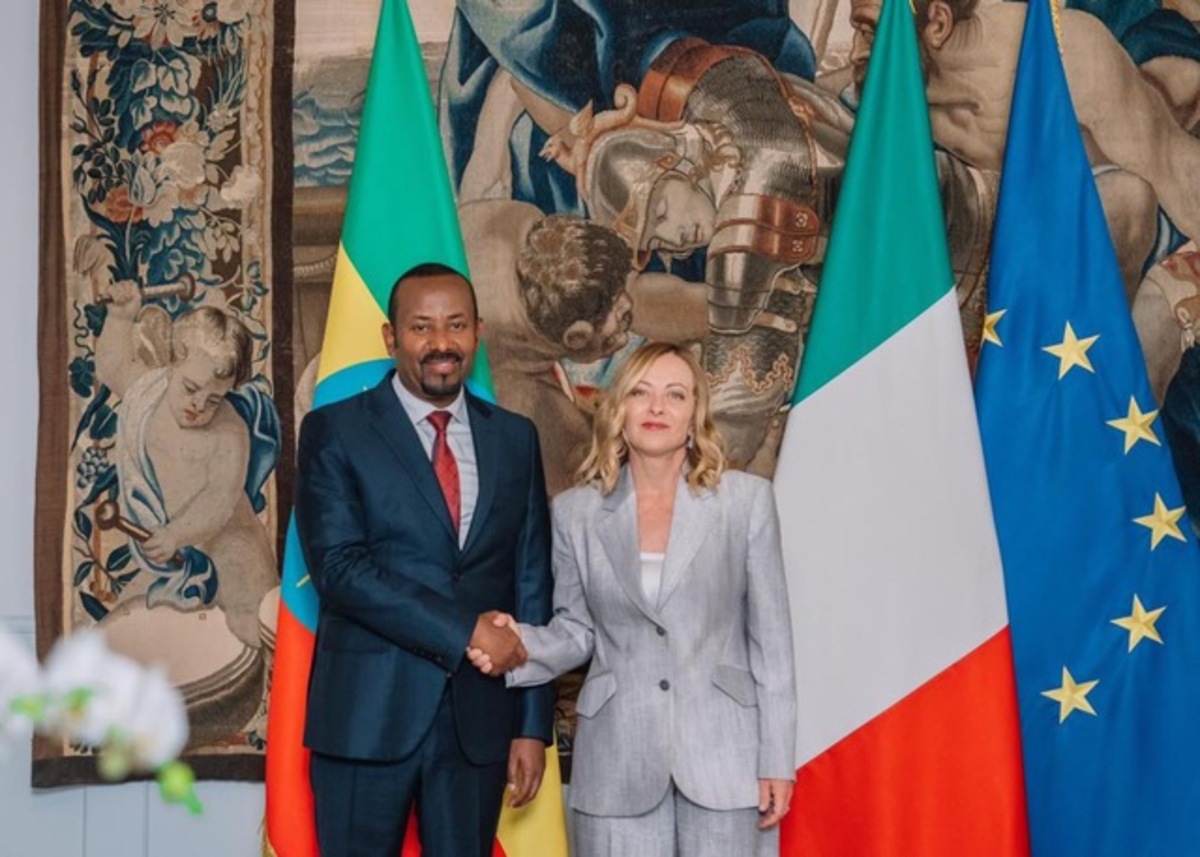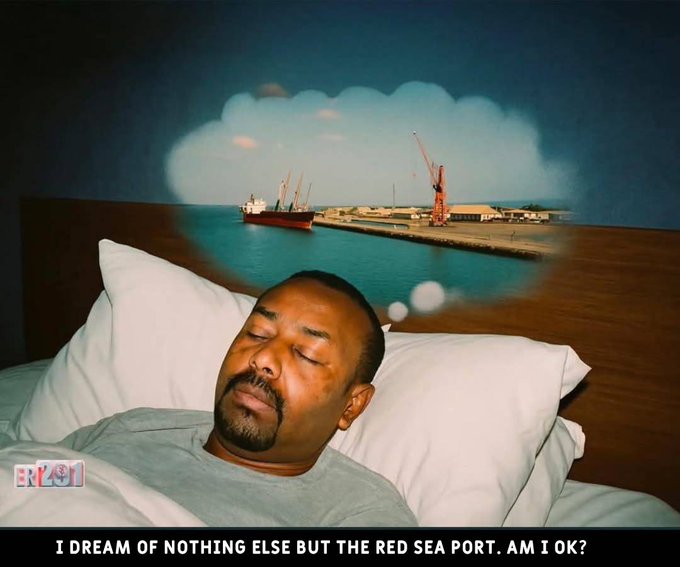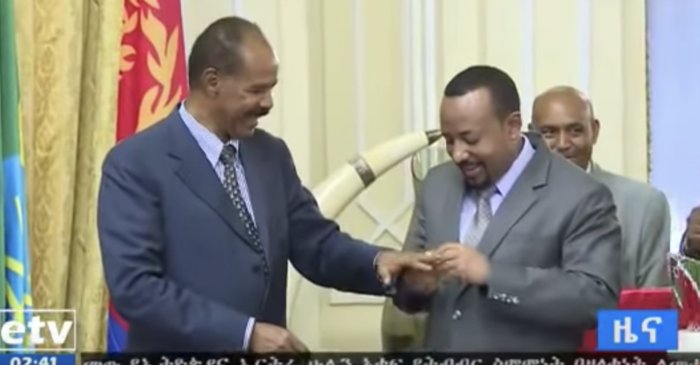ቮድካቸዉ ከዳ የድስት ፓርቲና፡ ኣቢይ፡ ብልግና ፓርቲ
He wanted to kiss her, but Abyi-na wouldn't turn her face.
ቮድካቸዉ ከዳ የድስት ፓርቲና፡ ኣቢይ፡ ብልግና ፓርቲ
Last edited by Zmeselo on 09 Jun 2025, 11:57, edited 2 times in total.
Re: He wanted to kiss her, but Abyi-na wouldn't turn her face.
I know you have been waiting for me to complete the prostitution & evil triangle for you:


Re: He wanted to kiss her, but Abyi-na wouldn't turn her face.
Foreign
Abiy Ahmed's European tour: diplomacy and shadows of war
Between Paris, Rome and the Vatican, the Ethiopian prime minister seeks political and financial support in view of a possible new war against Eritrea
By Marilena Dolce
https://www.affaritaliani.it/esteri/il- ... 72844.html
(Software translation)

Friday, 6 June 2025
At home, the economic crisis and repression fuel opposition to the government
On May 22, French President Emmanuel Macron received Ethiopian Prime Minister Abiy Ahmed in Paris. An almost unexpected visit, following the one on December 21, 2024 in Addis Ababa, with the declared aim of strengthening bilateral relations, based on a strategic friendship. The conversations between Abiy and Macron were “constructive,” the Ethiopian Prime Minister wrote on social media. Macron, for his part, stated on X that France sees a “prosperous and peaceful” future in Ethiopia.
France, however, was not the only European stop on the May tour.
A few days later, the prime minister flew to Rome to meet with Prime Minister Giorgia Meloni and Pope Leo XIV. He instead gave up on the English stop. In London, in fact, the Ethiopian diaspora had taken to the streets, against his possible visit, denouncing the massacres taking place in the Amhara region and the arrests of parliamentarians and opponents in Addis Ababa.
Officially, the purpose of the European trip was to attract new investments in Ethiopia. In reality, Abiy is aiming to secure the political support of the European Union. France could convince its German partner, while Prime Minister Meloni could mediate with the more conservative European governments.
The Italian media, which according to recent data dedicate a meager 14% of their coverage to East Africa, ignored the arrival of the Ethiopian prime minister, with the exception of the news agencies. On the other hand, Augustine Passilly, French correspondent in Addis Ababa, published an analysis of the trip in Le Point, also reporting sources useful for understanding its deeper purposes, beyond the apparent ones.
says Mahdì Labzaè, a researcher at the CNRS, Centre national de la recherche scientifique, and an expert on Africa,The main element of this tour,
The economic crisis is deep. The 265 million dollars that the International Monetary Fund should give to Ethiopia at the end of June will not be enough to revive a country where, according to a recent internal report, 26% of the 130 million inhabitants live in extreme poverty.was to probe the reaction of the allied countries in the event of a new war against Eritrea. Furthermore, the regime, on the verge of bankruptcy, is desperately seeking funding.
At a time when the economy is collapsing and internal consensus is zero, Abiy seems to want to shift attention to an external objective: Eritrea.
After Italian colonialism, after the years of federation and annexation to Ethiopia, in 1991 Eritrea gained independence. From 1998 to 2000, however, there was still war between the two countries and the subsequent Algiers agreements did not bring true peace, but rather a "non-war". It was only with the arrival of Prime Minister Abiy in 2018 that the dialogue resumed, having once again entered into crisis after the Pretoria Agreement between the Ethiopian government and Tigray.
Now Prime Minister Abiy is asking Eritrea to establish a commercial port in Assab and, above all, a naval base. He calls the loss of this port after Eritrean independence a “historical mistake”.
In reality, Eritrea has never denied access to the ports of Massawa and Assab for commercial activities. As for historical belonging, the ports have never been Ethiopian, except during the years of federation, annexation and military occupation. Independent Eritrea has reconquered the territory, delimited by the former colonial borders that included the ports.
The idea that a large country should have access to the sea could, however, find attentive ears in Europe, even if so far no European leader has openly supported this position. However, the stages of Abiy’s trip reveal the desire to obtain support in the event of a war against Eritrea.
It seems that the friendly tone of France has reassured Prime Minister Abiy. Macron has not failed to smile and shake hands, despite the accusations of serious human rights violations in the Amhara and Oromo regions.
Another lever that Abiy is trying to leverage is his commitment to respect the Pretoria Agreement (2022), signed after two years of war between the Ethiopian government (also supported by Eritrea) and the TPLF. Today, however, the Tigray People's Liberation Front is divided and the wing, led by Debretsion Gebremichael, has moved closer to Eritrea, fearing the possibility of a new war unleashed by Abiy.
In addition to the diplomatic route, Abiy is also seeking military support from Turkey, which has already provided drones used in the bombings in the Amhara region, and from the United Arab Emirates, which could support him in the event of a war against Eritrea.
According to internal sources, Ethiopian troops have been massing along the Eritrean border in recent months.
Desta Tilahun, secretary general of the Ethiopian People’s Revolutionary Party, also spoke about Europe, saying:
The opposition, often silenced or repressed, fears that Abiy’s trip to Europe was used to raise new funds, not to alleviate the crisis, but to complete luxury projects and strengthen the government’s power. In Rome, the prime minister also met Pietro Salini, CEO of Webuild, a construction company that should complete the Grand Renaissance Dam, Gerd, but who had complained about delays in payments.We need diplomatic relations with the European Union, but they must benefit the people, not just one leader. European politicians must know that in Ethiopia people die every day from hunger, internal conflicts, inflation. Children do not go to school, young people are forced to fight. I have never seen such chaos. If Ethiopia collapses, the world will suffer the consequences.
Meanwhile, in mid-May, a massive strike by health workers broke out in Ethiopia, to protest against terrible working conditions and low wages. Strikes were followed by repression, with hundreds of arrests, as reported by Amnesty International.
Abiy's tour ended in the Vatican, with a meeting with Pope Leo XIV. On social media, the prime minister thanked for the "warm welcome" and for the shared commitment to global peace. A message that sounds ambivalent, on the eve of a possible new conflict with Eritrea, feared by many.
Re: He wanted to kiss her, but Abyi-na wouldn't turn her face.
So hugging somebody or wanting to give them a french kiss, is the same thing to you?
Your sexuality, is questionable!
Your sexuality, is questionable!
Last edited by Zmeselo on 09 Jun 2025, 15:28, edited 1 time in total.
Re: He wanted to kiss her, but Abyi-na wouldn't turn her face.
እኛ ደግሞ ኢትዮጵያ ወደባችንን በሃይል ነጥቃ የተጠቀመችበት መንገድ በጣም ይቆጨናል። ቁጭታችን ትግላችንን ወልዶ መሬታችንን አስመልሰናል።
The claim that Ethiopia “lost” its ports overlooks the historical reality that Ethiopia never legally possessed ports of its own, relying instead on Eritrean ports during the period of Eritrea’s federation and annexation.
When did Ethiopia "lose" its ports?
1) In 1557, when the Ottoman Empire controlled the Red Sea Coast?
2) Or on July 5, 1882, when Italy established the colony of Assab?
3) Or, on March 15, 1883, when Italy signed a treaty with Mohamed Anfari, Sultan of Assab, with Article 8 stipulating Italian protection of the Danakil coast? Or when the King of Showa approved this on May 22, 1883?
4) Or in 1884, at the Treaty of Hewitt, when Abyssinia agreed to free transit of goods, including arms, through Massawa, recognizing that the Port of Massawa didn't belong to Abyssinia?
5) Or on December 9, 1888, when a treaty with Sultan Mohammed recognized Italian sovereignty over the Danakil coast from Amfile to Ras Dumeira, consolidating earlier agreements?
6) Or in 1889, when Abyssinia recognized Eritrea as an Italian colony even before Italy formally announced the colony of Eritrea?
7) Or, in 1897, when Emperor Menelik II requested Italy demarcate the boundary 60 km from the Red Sea coast, acknowledging Italian control over Eritrea’s ports?
8 ) Or, in 1887, when Emperor Yohannes IV had urged Italians to remain on the coast?
9) Or, in May 1909: when Emperor Menelik II proclaimed to Ethiopian nobles that the Indian Ocean was Ethiopia’s boundary?
10) Or, in 1927, when Tafari Mekonnen (later Haile Selassie) referenced a 1924–1925 agreement with Mussolini to demarcate the border with Italian Eritrea, repeating the request in 1929.
These communications confirmed Italian sovereignty over Eritrea’s ports, with no Ethiopian ownership.
11) Or on August 2, 1928, when Abyssinia signed the Treaty of Friendship and Arbitration to use the Port of Assab on lease?
12) Or was it on June 30, 1936, when Haileselassie appealed to the League of Nations regarding the invasion by Italy? Of course, he forgot to include Eritrea?!
13) Or, Was it when the UNGA ignored your claims and passed UN General Assembly Resolution 390(V) in 1950 to federate Eritrea with Ethiopia, granting Ethiopia access to Eritrean ports like Assab and Massawa. NOT OWNERSHIP.
In 1962, Ethiopia annexed Eritrea, unilaterally dissolving the federation, and continued using these ports until 1991.
14) Or was it on May 24, 1991, the Eritrean People’s Liberation Front (EPLF) liberated Eritrea ending Ethiopia’s control over Eritrea and its ports? That was a decisive military defeat. No amount of regret would reverse that.
15) Was that when, from April 23–25, 1993, a UN-supervised referendum confirmed Eritrea’s independence, with 99.83% voting in favor?
That was self-determination.
FEW REMINDERS
Recognition of our rights for self-determination means, that Ethiopia was in Eritrea illegally and used our ports by annexing Eritrea.
-UN Secretary-General Boutros Boutros-Ghali stated the referendum aligned with the UN’s mandate for self-determination and decolonization.
-U.S. Assistant Secretary of State Herman Cohen endorsed the referendum on May 27, 1991, citing Eritrea’s unique colonial history and recognized that it was the right for self-determination
-African Union Commission Chairperson H.E. Mahmoud Ali Youssouf, described Eritrea’s independence as the result of decades-long struggle for self-determination as a testament to its people’s resilience and a symbol of dignity and freedom
-U.S. Secretary of State Marco Rubio said,
On this occasion( Eritrean Independence Day), we recognized the deep spirit that motivates Eritrean history and culture...
Ethiopia never legally owned ports but accessed Eritrean ports during the federation (1952–1962) and annexation (1962–1991).
Re: He wanted to kiss her, but Abyi-na wouldn't turn her face.

Keep this delusional leader, occupied on his own turf by any means necessary. Offer support to any political and armed group committed to removing his áss from power.
And if he still dares to cross our red line, respond decisively head on and finish him.
Last edited by Zmeselo on 09 Jun 2025, 17:23, edited 1 time in total.
Re: He wanted to kiss her, but Abyi-na wouldn't turn her face.
How Ironic: Who Is the Victim and Who Is the Aggressor?
Ethiopia's Prime Minister's inflammatory rhetoric reveals a dangerous, dishonest agenda. His recent four-part interview, filled with doublespeak, aims to distract from domestic crises and bolster support before next year's elections. Behind exaggerated 'miraculous' economic claims, his remarks about ports expose reckless ambition driven by historical revisionism and expansionist intent.
In a revealing one-minute segment, he threatens war with Eritrea, blaming it for Ethiopia's landlocked status and portraying Ethiopia as a victim of territorial loss. Here’s a concise breakdown of these baseless claims:
 Who is the real victim?
Who is the real victim?
Eritrea, not Ethiopia, was colonized. Eritreans endured massacres, rape, imprisonment, and brutalization. Eritrean villages were burned, communities exiled, and sovereignty undermined for decades. Eritreans paid for freedom with blood and sacrifice, and still bares the scars.
 Who lost the ports?
Who lost the ports?
Eritrea’s ports were never Ethiopia’s. Stolen with global powers’ complicity in the 1940s, they were reclaimed after 30 years of Eritrean struggle. A thief cannot claim victim-hood when stolen property is returned.
 What does history show?
What does history show?
Ethiopia has never owned ports in modern history. Claims otherwise are fiction. Invoking history risks exposing Ethiopia’s fragile federal structure.
 Landlocked status: what does it mean?
Landlocked status: what does it mean?
Ethiopia’s landlocked status is a geographical fact, not a geographical prison or a pretext for territorial ambition. Many landlocked nations access ports through diplomacy, not threats or revisionist fantasies.
Ethiopia is not the victim. This is a deliberate attempt to manufacture a crisis, sow inferno and destabilize the Horn of Africa, and violate international law. The international community must take notice.
Ethiopia's Prime Minister's inflammatory rhetoric reveals a dangerous, dishonest agenda. His recent four-part interview, filled with doublespeak, aims to distract from domestic crises and bolster support before next year's elections. Behind exaggerated 'miraculous' economic claims, his remarks about ports expose reckless ambition driven by historical revisionism and expansionist intent.
In a revealing one-minute segment, he threatens war with Eritrea, blaming it for Ethiopia's landlocked status and portraying Ethiopia as a victim of territorial loss. Here’s a concise breakdown of these baseless claims:
Eritrea, not Ethiopia, was colonized. Eritreans endured massacres, rape, imprisonment, and brutalization. Eritrean villages were burned, communities exiled, and sovereignty undermined for decades. Eritreans paid for freedom with blood and sacrifice, and still bares the scars.
Eritrea’s ports were never Ethiopia’s. Stolen with global powers’ complicity in the 1940s, they were reclaimed after 30 years of Eritrean struggle. A thief cannot claim victim-hood when stolen property is returned.
Ethiopia has never owned ports in modern history. Claims otherwise are fiction. Invoking history risks exposing Ethiopia’s fragile federal structure.
Ethiopia’s landlocked status is a geographical fact, not a geographical prison or a pretext for territorial ambition. Many landlocked nations access ports through diplomacy, not threats or revisionist fantasies.
Ethiopia is not the victim. This is a deliberate attempt to manufacture a crisis, sow inferno and destabilize the Horn of Africa, and violate international law. The international community must take notice.
Re: He wanted to kiss her, but Abyi-na wouldn't turn her face.
አቀፈ፣ አሻሸ፣ ሳመ፣ ቀለበት አጠለቀ ያው ሁሉም በወረት የመሽርሞጥ መገለጫዎች ናቸው።
የቸገረው እርጉዝ ያገባል - የሚፈልገውን ነገር ለማግኘት ሲል ፣ የጭልፊቱ አታቱርክ የማያቅፈውና የማያሽሞነሙነው ሰው የለም።
የቸገረው እርጉዝ ያገባል - የሚፈልገውን ነገር ለማግኘት ሲል ፣ የጭልፊቱ አታቱርክ የማያቅፈውና የማያሽሞነሙነው ሰው የለም።
-
Deqi-Arawit
- Senior Member
- Posts: 15749
- Joined: 29 Mar 2009, 11:10
- Location: Bujumbura Brundi
Re: He wanted to kiss her, but Abyi-na wouldn't turn her face.
Mini skuni
Who Exchanged engagement ring to each other. This g$y staff started with the sodomite dictator.
Re: He wanted to kiss her, but Abyi-na wouldn't turn her face.
Exchange?
Do you even know the meaning of the word, aregit shérmuta?
We only saw one person giving.

Do you even know the meaning of the word, aregit shérmuta?
We only saw one person giving.

Deqi-Arawit wrote: ↑09 Jun 2025, 16:45Mini skuni
Who Exchanged engagement ring to each other. This g$y staff started with the sodomite dictator.